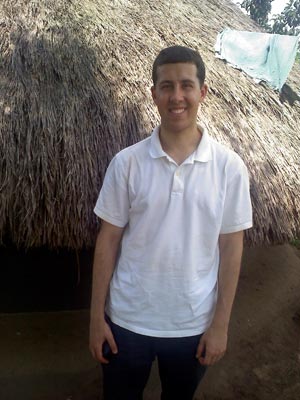Lending a hand
Alumnus works for microfinance organization, Kiva, in Africa
I've been in Kampala, Uganda, for about a month now, and the city is starting to really feel familiar. I can now orient myself by the frenetic Taxi Park or the bustling Nakasero produce market, generally know how much things should cost, and have my lineup of “boda-boda” motorcycle drivers and food sellers who I can rely on for daily transport and sustenance. Ironically, I feel more connected to these dozen or so local merchants than I do to their counterparts back in the States, despite the far more numerous interactions I’ve shared with the latter. Maybe it’s the isolation of a foreigner in a new place that causes me to come back to the people who I trust; that and lacking proximity to my friends makes me put more value on the social interactions of conducting business.

As a Kiva Fellow, I am a humble assistant to this effort, overseeing the relationship between the field partners and Kiva, and giving hands-on support where needed. To give you a glimpse of the scope of these efforts, my work with just one MFI in Uganda has included walking five kilometers to find a rural borrower near the Democratic Republic of the Congo; watching an original song and dance performed by young adolescents who are also borrowers—I wasn’t responsible enough at that age to remember homework assignments, much less take on debt; and interviewing a young businesswoman in the West Nile region who has managed to simultaneously operate a drugstore, sugar-selling collective, and tailoring business. It is truly astounding the work that both the MFIs and the borrowers do. And while I’m not naïve enough to think microfinance will “cure” poverty in Uganda and other developing countries, I know that MFIs’ services really do make demonstrable differences in the lives of poor clients. One woman in Northern Uganda, which was wracked by a violent insurgency for many years, was able to keep her fish mongering business despite having to relocate to a makeshift refugee camp, thanks to a loan from my MFI. She also spoke about the importance of being in a group of borrowers, since it gave her a community when her family was splintering in the wake of the insurgency. A multitude of stories like these abound throughout microfinance, and all demonstrate the resiliency of borrowers to persevere through challenging situations on their own terms, with only a small level of support.
Participating in this fellowship has also given me a lot of time to think—unlike the apparently superhuman borrowers, I have occasional downtime. I think a lot about my role as a Westerner in Africa, particularly as someone engaged in “development” work. What do impoverished populations really need? Is it for the developed world to give them a hand up, or is it to get out of their way and let them address their own problems? What about my presence here—how does it affect Africans’ conception of their own continent when many white, Western volunteer visitors are coming to “save the world?” I certainly don’t feel that way, and think that Kiva does a great job of fostering genuine partnerships to work equitably on the challenge of global poverty, but the questions persist. And the longer I’m here, the more I grasp that there often aren’t clear answers to these questions; the important thing is simply to struggle with them. The school of complete self-reliance for developing countries is met pretty squarely by my borrowers, who despite their pride in their self-financed businesses, are still desperate for financial support and are routinely disappointed that I’m not from a donor agency. On the other side, several Ugandan professionals I interact with bristle at the way they perceive that donor countries are injecting themselves in the upcoming Ugandan election. So I’m learning firsthand that there will always be conflicts in development; the best I can do is be thoughtful about my role and interact with people in Uganda and other developing countries as equitably and affably as possible. And luckily, that’s something that the reliable boda-boda drivers and cassava merchants of Kampala can help me learn every day I’m here.